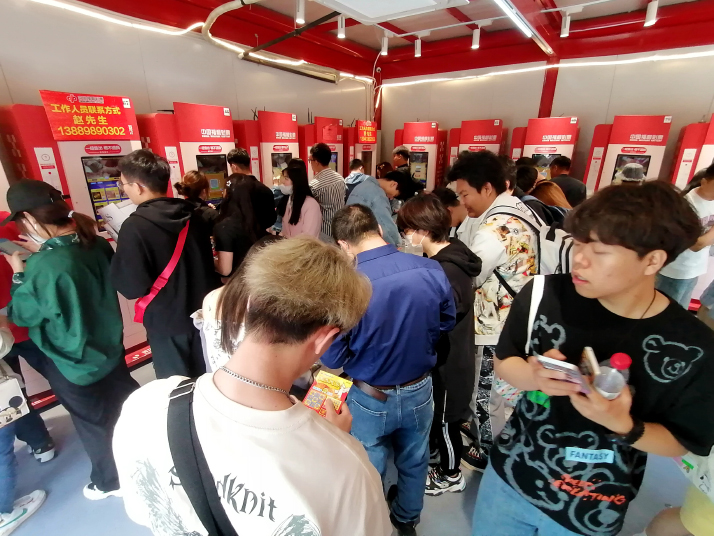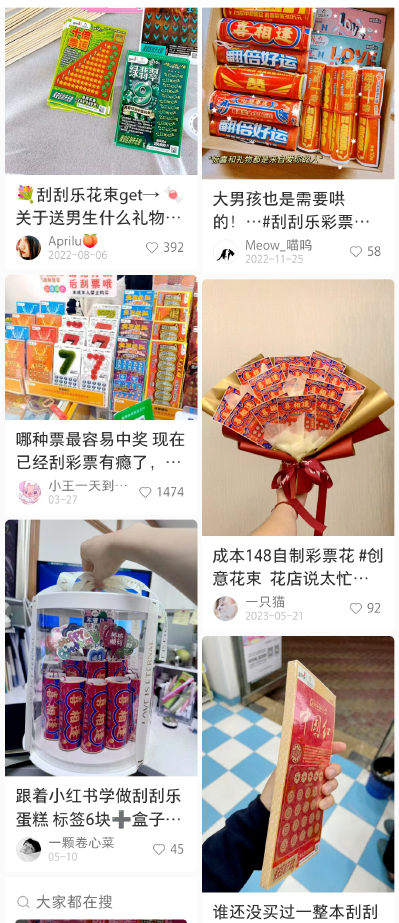
Wang Siyi, a university student in Beijing, was surprised to find that scratch cards were sold out at several lottery shops she visited in mid-May. Scratch cards, also known as scratch-offs, are a type of instant lottery that has become increasingly popular among young people.
She had planned to buy two scratch cards to give as a gift to her boyfriend on May 20, which has become known as another Valentine's Day in China, as the pronunciation of "520" sounds similar to "I love you" in Chinese. After visiting six shops, Wang finally managed to get two scratch cards with a face value of 20 yuan ($2.76) each.
"I got the idea of using scratch cards as Valentine's gifts from short video platforms. It's both fun and cost-efficient compared with traditional gifts. I was really looking forward to the thrill of scratching the tickets, though we didn't win anything," Wang told Beijing Review.
For many young lottery players in China, the social aspects of buying lottery tickets have become more important than the prospect of winning. Lottery tickets are entering young people's lives, as a new form of entertainment and a way to socialize with their peers.
Rising popularity
The China Sports Lottery and the China Welfare Lottery are two of the country's major lotteries, and are respectively operated by the General Administration of Sport and the China Welfare Lottery Distribution and Management Center under the Ministry of Civil Affairs. While they both mainly aim to raise funds for public welfare causes, the two lotteries differ in their formats, sales channels, prize distribution and the specific purposes of the funds raised.
In the first three months of this year, lottery ticket sales surged 19.7 percent year on year to 149.47 billion yuan ($20.62 billion), according to data released by the Ministry of Finance in late April. Based on these data, the per-capita value of lottery tickets purchased nationwide in the first quarter of this year approximated 106 yuan ($14.62).
In this March, China's lottery ticket sales increased 11.7 percent year on year, topping 55.6 billion yuan ($7.67 billion). Sales of lottery tickets to support the welfare system reached 18.88 billion yuan ($2.6 billion), a 22.4-percent year-on-year surge. Lottery tickets sold to support the sports sector rose 6.9 percent year on year to 36.72 billion yuan ($5.06 billion).
Scratch cards have recently emerged as a popular lottery product among many young professionals in China. According to a report in Beijing Youth Daily in March, these young players have incorporated scratch-off tickets into their daily routines. Some choose to scratch a portion of the ticket each day, while others opt to scratch the entire ticket at once, as a fun way to start their workdays.
On social media platforms like Douyin, the Chinese version of TikTok, and Xiaohongshu, a popular lifestyle and e-commerce app, influencers and users post videos of themselves scratching piles of tickets. Some videos even explore "How much money can you make by clearing out a store's scratch tickets?" or suggest "Randomly selecting scratch tickets and eating as much food as your prize money can buy if you win." There are also videos showing people trading a pile of tickets for meals at food stalls and restaurants as a way of socializing. These videos have garnered views in the millions.
In shopping malls, metro stations and on street corners, the newly established lottery kiosks are filled with young people intently scratching instant lottery tickets. Moreover, scratch cards have become a popular choice as wedding gifts for newlyweds, and some people even turn the tickets into creative bouquets to give as presents.
Official data show that in the first three months of this year, a total of 38.9 billion yuan ($5.36 billion) worth of instant lottery tickets were scratched, an increase of 17.4 billion yuan ($2.4 billion) compared to the same period last year, a staggering year-on-year growth of 81.4 percent. This sweeping popularity has led to some lottery shops experiencing stock shortages or selling-out.
"I've noticed that the customers purchasing machine-printed lottery tickets, such as those used in lottery draws, tend to be middle-aged and senior lottery players," Wang Shunqiang, owner of a lottery kiosk located in a shopping mall in Langfang, Hebei Province, explained to Beijing Review. "On the other hand, the younger generation typically comes to our shop with the sole purpose of buying scratch-off tickets, often on their way to shop or while waiting in line to eat at a nearby restaurant."

Not just for fun
Under China's lottery management rules, funds raised from ticket sales are used for administrative expenses and public welfare projects, in addition to funding prizes.
For example, from 2007 to 2022, the special lottery public welfare fund authorized by the State Council, China's highest state
administrative organ, provided over 23.92 billion yuan ($3.3 billion) in funding to support people with disabilities, From hosting events like the Asian Para Games to supporting the training of athletes with disabilities and the construction of daily rehabilitation facilities, the fingerprints of China's lottery can be found on many programs supporting the development of disabled persons.
Starting from 2014, the special lottery public welfare fund began to be used to assist economically disadvantaged children with birth defects. The allocation of these lottery public welfare funds has helped support medical care and intervention for children born with congenital disabilities, as well as efforts to raise awareness and educate the public on birth defect prevention.
"If I purchase a scratch-off ticket with a face value of 20 yuan, 4 yuan (around $0.55) is allocated toward welfare causes. It's an activity that is both entertaining and meaningful. I'm willing to buy them even if I don't end up winning any prize," Wang Siyi said.
Experts believe that amid the booming popularity of lottery tickets, in addition to exploring market potential and regulating market supply, it is also crucial to strengthen industry management and provide proper guidance. This includes helping more people understand the public welfare nature of lotteries, and guarding against the potential negative impacts stemming from a purely speculative mindset.
"I hope lottery participation rates in China will become even higher. Lotteries are developing more as a form of public welfare undertaking and entertainment product, not just an investment," Wang Xuehong, a researcher at the Chinese Academy of Fiscal Sciences, told news website Cnr.cn. "I believe the public needs to correctly understand and rationally consume lotteries, so that the country's lottery industry can develop in a healthier, more standardized and more rational manner."
Copyedited by G.P. Wilson
Comments to luyan@cicgamericas.com